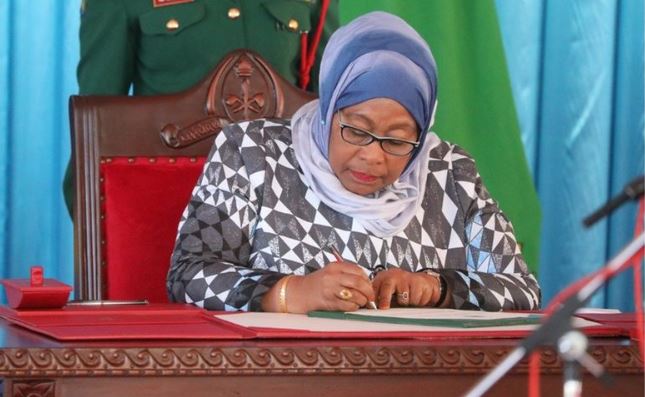Tembelea Child-Help International

Kulingana na vyanzo kutoka gazeti la Mwananchi, Mwandishi Herieth Makwetta aliripoti kwamba mwezi mmoja baada ya Bunge la Jamhuri ya Muungano wa Tanzania kupitisha Muswada wa Bima ya Afya kwa Wote, Rais Samia Suluhu Hassan aliusaini kuwa sheria.
Novemba 2, 2023, bunge lilipitisha muswada huo na kufanya historia, baada ya kushindwa kuafikiana kwa karibu miaka mitano tangu ulipofufuliwa mwaka 2018. Taarifa iliyotolewa na Wizara ya Afya jana, Desemba 4, inasema kuwa muswada huo tayari umesainiwa na rais na utakuwa sheria rasmi baada ya kuchapishwa kwenye gazeti la serikali mwezi Desemba 2023.
Sahihi ya rais kwenye sheria inampa Wizara ya Afya jukumu la kutunga kanuni ili kuanza utekelezaji wa sheria hiyo, ambayo itawawezesha... Watanzania watapata huduma za afya bila vikwazo vya kiuchumi. Ili kufanikisha hilo, kamati ya kudumu ya bunge kuhusu masuala ya afya na UKIMWI, ilisisitiza umuhimu wa kuwa na mfuko wa kugharamia bima ya afya kwa maskini, na serikali inapaswa kuusimamia ili kuhakikisha kila raia anapata huduma bora za afya.Kupitia sheria hiyo kutakuwa na utaratibu wa kutambua na kusajili kundi la watu wenye ulemavu (PWDs), kwa lengo la kuhakikisha wanapata huduma za afya bila vikwazo vya kifedha. Kundi hilo litaingizwa katika mpango wa bima ya afya ya umma kwa njia itakayobainishwa katika kanuni zitakazotungwa baadaye.
Wakati akisoma muswada bungeni kwa mara ya mwisho, Waziri wa Afya, Ummy Mwalimu alisema kuwa chanzo... Chanzo cha mapato kitakachotumika kufadhili mpango huu kitasajili sehemu ya mapato ya kodi kutoka kwa ushuru wa bidhaa (ushuru unaotozwa kwa bidhaa na huduma maalum). "...kama vile vinywaji vyenye gesi, vinywaji vyenye pombe, bidhaa za vipodozi, ushuru wa kamari, ada ya bima ya magari na mapato kutoka kwa kodi ya muamala wa kielektroniki..." alisema Waziri Ummy Mwalimu.
Mkurugenzi wa CHT, Bwana Hakim alizungumzia habari hii akisema kuwa sheria hii ni maendeleo ya kuinua, moja ambayo mashirika... kama CHT yamekuwa yakipigania. miaka. Mkurugenzi aliendelea kwa kusema kwamba, ingawa CHT inashukuru kwa jitihada zote ambazo serikali inazifanya katika kufungua njia, kuna jumuiya kubwa ya watu wenye ulemavu, baadhi ya makundi yakihitaji kipaumbele zaidi kuliko mengine, na serikali itahitaji muda na rasilimali kufikia jamii yote. Jambo la msingi ni kwamba, wakati serikali ikijiandaa kutekeleza sheria hiyo, timu ya CHT itaendelea na utekelezaji wa kampeni zao za ukusanyaji wa fedha za kuchangia bima ya afya kwa watoto walio chini ya uangalizi wao na wanaohitaji msaada wao kwa dharura, na inawahimiza wadau wote kujitokeza na kuchukua hatua. Hii ni utekelezaji wa ombi la serikali kwa mashirika kama CHT na sekta binafsi kushirikiana kusaidia watu wenye ulemavu.